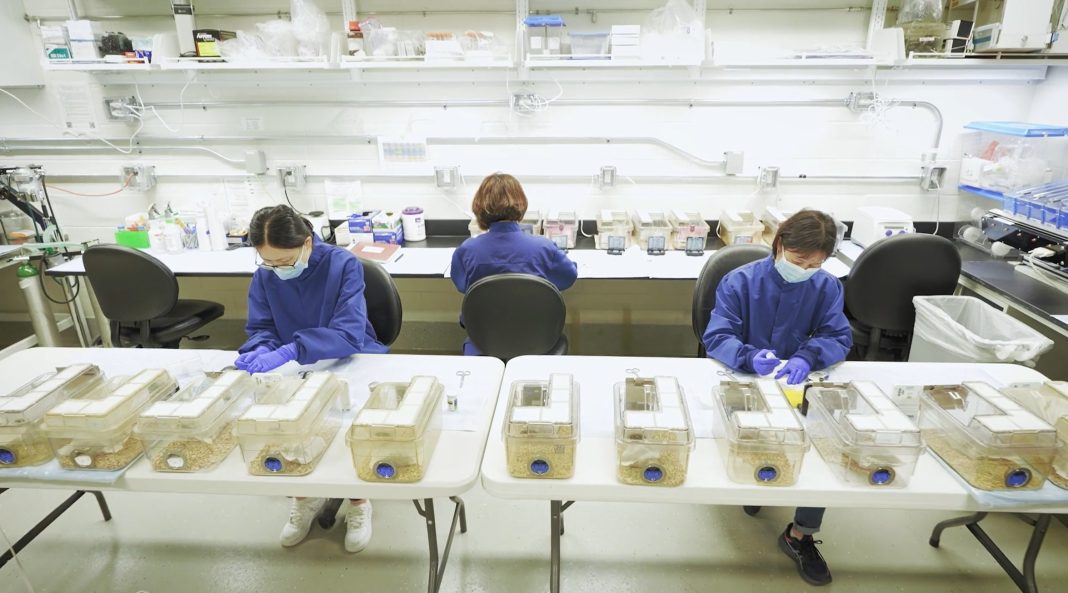Professor Carol F. Elias, from the University of Michigan’s Department of Molecular & Integrative Physiology, discusses key research opportunities enabled by the NIDDK Mouse Metabolic Phenotyping Center in live models – MMPC-Live
The research community increasingly confronts challenges in accessing, applying, and executing specialized techniques to evaluate nuanced quantitative and qualitative phenotypes in the growing array of genetically altered (e.g., transgenic, knockout), surgically modified (e.g., bariatric surgery), and environmentally influenced (e.g., high-fat diet) mouse models. The expertise, equipment, and capabilities required to perform intricate physiological, metabolic, and behavioral assessments in live mice are often unavailable at every research institution involved in diabetes and obesity studies. In 2001, the National Institute of Diabetes and Digestive and Kidney Diseases (NIH-NIDDK) established the Mouse Metabolic Phenotyping Centers (MMPCs) to provide the scientific community with subsidized, high-quality, specialized phenotyping services. As of 2023, these centers exclusively offer services for live mouse models of obesity, diabetes, and related complications and have been rebranded as MMPC-Live.
MMPC-Live operates as a Consortium of four National Centers: Vanderbilt University (RRID: SCR_021939), Yale University (RRID: SCR_006339), the University of Michigan (RRID: SCR_015354), and the University of California at Davis (RRID: SCR_015357). A coordinating unit (CU) is based at Augusta University (RRID: SCR_008997).
MMPC-Live conducts complex and often unique in vivo procedures fee-for- service, typically involving mice shipped from the client or sourced directly from a repository or vendor. Current areas of expertise encompass energy balance and body composition, food intake and behavior, insulin action and secretion, whole-body carbohydrate, and lipid metabolism, and hypothalamic, cardiovascular, and renal function. The Centers offer consultation and guidance on experimental design, develop and refine test protocols, engage in outreach activities, publish scientific and technical papers, and organize educational workshops and training sessions to aid researchers in understanding the heterogeneity of diabetes and obesity.
MMPC-Live is structured as an outward facing consortium of collaborating Centers with service cores that provide all research communities with standardized metabolic, physiologic, and behavioral phenotyping tests. This standardization offers significant advantages, particularly for researchers who may lack access to specialized equipment or have limited experience with physiologic testing in live mice. By implementing standardized procedures, MMPC-Live ensures that data is consistent and reliable across diverse studies, enhancing rigor, reproducibility, and scientific collaboration. Moreover, standardization reduces costs for MMPC-Live users by minimizing the need for costly, specialized equipment and training, making complex research approaches more accessible to a wider range of research institutions. The MMPC-Live serves investigators outside their home institution with the same priority and cost structure as internal users.
Each Center hosts at least one Metabolic Phenotyping Core offering similar and often distinct specialized services and procedures. Core personnel can design, adapt, standardize, and validate various tests conducted on mice provided by clients. Although the availability of staff and instruments may vary, the Centers generally possess adequate laboratory and vivarium infrastructure and expert and experienced staff to handle most incoming user requests. If the required technology is unavailable, the Center will direct the client to another member of the consortium with the capabilities to execute the service. The Centers can manage hundreds of mice across various testing platforms through efficient project scheduling, staggered testing, and cross-training staff on multiple procedures. The Centers also advise on preliminary screening strategies and tests that can be performed and analyzed to inform and guide subsequent secondary and tertiary testing plans.
Another unique feature of the Phenotyping Cores is the ability to conduct multiple measurements on a single mouse, which enables more precise analyses of pathophysiological responses to conditions leading to diabetes or obesity while also reducing the total number of experimental animals required for a study. This practice aids in reducing and refining the number of mice used in research, aligning with the 3R principle of humane animal experimentation.
VIBRANT Program
The NIDDK, through the MMPC-Live Consortium, has launched the VIBRANT Program, an initiative designed to support early career scientists, especially those from underrepresented groups in the biosciences, individuals from disadvantaged backgrounds, and researchers from institutions that traditionally receive limited research funding or serve historically underrepresented populations.
A growing list of benefits for Vibrant-eligible researchers are available, such as:
- Discounts on phenotyping services
- Experimental design consultation
- Travel awards for scientific meetings
- Hands-on training
- Expert review of grant applications before submission
- Career development activities
These resources aim to enhance the competitiveness of these researchers and institutions in securing research funding related to diabetes, obesity, and cardiometabolic health. VIBRANT activities are intended to foster a diverse, high-quality national biomedical research workforce and ultimately reduce health disparities in the United States.
The VIBRANT Program works towards health equity and diversity in the US biomedical research field by assisting historically underrepresented investigators in securing biomedical research funding in diabetes and obesity.
The MMPC-Live Centers are supported by NIH U2C grants DK135074, DK135073, DK134901, DK135066, and a U24 grant DK135044.
Additional Resources:
- National Institute of Diabetes and Digestive and Kidney Diseases: www.niddk.nih.gov
- MMPC-Live: www.mmpc.org
- Augusta University: www.mmpc.org/
- University of Michigan: mmpc.med.umich.edu/, https://vimeo.com/945907046/a97eaddde0?&login=true#_=_
- University of California Davis: mpc.ucdavis.edu/
- Vanderbilt University: vmmpc.org/
- Yale University: medicine.yale.edu/internal-medicine/drc/resources/institutional/mmpc/
Reference
Laughlin M, McIndoe R, Adams SH, Araiza R, Ayala JE, Kennedy L, Lanoue L, Lantier L, Macy J, Malabanan E, McGuinness OP, Perry R, Port D, Qi N, Elias CF, Shulman GI, Wasserman DH, Lloyd KCK. The mouse metabolic phenotyping center (MMPC) live consortium: an NIH resource for in vivo characterization of mouse models of diabetes and obesity. Mamm Genome. 2024 Aug 27. doi: 10.1007/s00335-024-10067-y. Online ahead of print. PMID: 39191872


